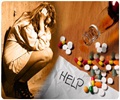We often think that the adverse effects of heavy drinking may not reflect in tasks such as driving especially if the blood alcohol concentration is zero

The study showed that hangovers can markedly elevate errors while driving. They portrayed slower reacting times, and drove at inconsistent speeds.
"The magnitude of driving impairment is higher than that observed with a blood alcohol concentration of 0.05 per cent, which is the legal limit for driving in many countries," says Dr Joris Verster of Utrecht University.
The study suggests that the effect of hangovers on driving performance must be a part of driver safety initiatives.
Source-Medindia












